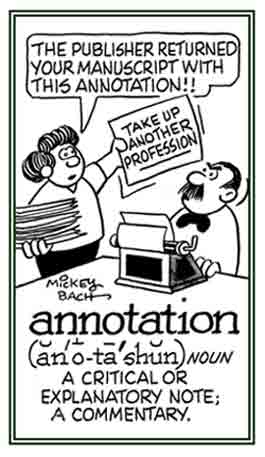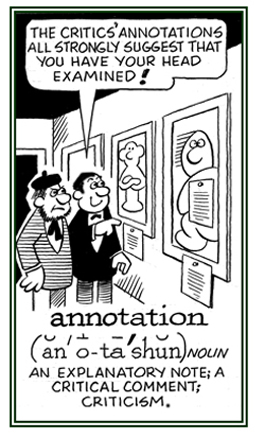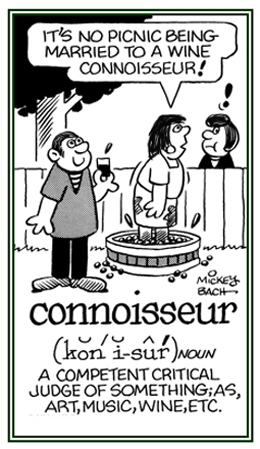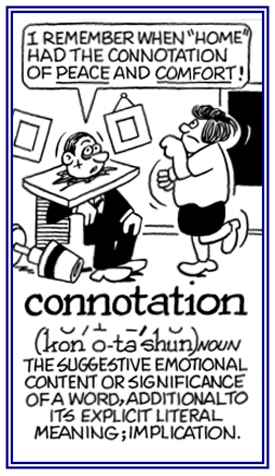not-, nosc-, nit-
(Latin: from gnoscere, to come to know, to get to know, to get acquainted [with]; know, learn; mark, sign; and cognoscere, to get to know, to recognize)
annotate (verb), annotates; annotated; annotating
To add notes and comments to the text in a piece of writing, a book, a drawing, etc. with critical commentaries or explanatory notes: "Carol has been annotating the contents of several of John's dictionary entries for quite awhile."
An explanatory comment, footnote, notation, or suggestion explaining or criticizing certain aspects of a literary presentation: This special online lexicon has annotations that can help users to better understand the meanings and applications of the word entries that are listed.

© ALL rights are reserved.

© ALL rights are reserved.
Go to this Word A Day Revisited Index


Go to this Word A Day Revisited Index
so you can see more of Mickey Bach's cartoons.
1. The procedure of becoming knowledgeable, including perception, reasoning, judgement, awareness, and intuition: Janet used her cognition to learn different foreign languages which otherwise would not have been possible!
Some people have mental disabilities that affect their cognitions and judgments in a negative way.
2. Etymology: from the Latin stem cognition-; from cognoscere, "to get to know"; from (g)noscere, "to know".
cognitional (adjective), more cognitional, most cognitional
A reference to the act or process of perceiving and learning about something; including, both awareness and judgment: Mrs. Smith was very pleased to see the cognitional progress her students were making in her German class because now they could speak in that language and actually understand what they were saying to each other!
cognitive (KAHG ni tiv) (adjective), more cognitive, most cognitive
1. Pertaining to the mental processes of perception, memory, judgment, and reasoning, as contrasted with emotional and volitional processes: Cognitive development in a child can be seen in his or her ability to think in order to solve problems.
2. Relating to acquiring knowledge by the use of thought processes of intuition or perceptions: Sharon had a premonition or cognitive discernment of what could happen if she pealed an apple too fast, so she pared it slowly to avoid cutting herself.
2. Relating to acquiring knowledge by the use of thought processes of intuition or perceptions: Sharon had a premonition or cognitive discernment of what could happen if she pealed an apple too fast, so she pared it slowly to avoid cutting herself.
cognoscible (adjective), more cognoscible, most cognoscible
A reference to that which is capable of being known: Since the article was published in the local newspaper, and therefore being congnoscible information, the readers were able to learn about the accident which took place in their town the previous day.
cognoscitive (adjective), more cognoscitive, most cognoscitive
Referring to having the ability to know or to discover information and to utilize it during a learning process: Because the elementary-school students had learned to read and to write, they possessed the cognoscitive skills to write about many topics during the year.
1. Someone with informed and discriminating taste: Mark and Madeline were connoisseurs of fine wines.
2. Those who are especially competent in sharing critical judgments in an art, particularly one of the fine arts, or in matters of taste: Madeline was a connoisseur of modern-artistic portraits.
3. A discerning judge of the best in any field: Bert was a connoisseur of race horses, having been in this profession for more than 30 years.
4. Etymology: from Old French connoisseor; from connoistre, "to know"; from Latin cognoscere, "to learn, to know, to recognize"; from com-, "with, together" + gnoscere, "to recognize".

© ALL rights are reserved.

© ALL rights are reserved.
Go to this Word A Day Revisited Index
2. Those who are especially competent in sharing critical judgments in an art, particularly one of the fine arts, or in matters of taste: Madeline was a connoisseur of modern-artistic portraits.
3. A discerning judge of the best in any field: Bert was a connoisseur of race horses, having been in this profession for more than 30 years.
4. Etymology: from Old French connoisseor; from connoistre, "to know"; from Latin cognoscere, "to learn, to know, to recognize"; from com-, "with, together" + gnoscere, "to recognize".


Go to this Word A Day Revisited Index
for a list of additional Mickey Bach illustrations.
connotate (verb), connotates; connotated; connotating
A commonly understood cultural or emotional association that some word or phrase carries: The term “home” has a connotation of family, comfort, warmth, security, and love; however, it also simply means a place where people live whether in harmony or not.

© ALL rights are reserved.
Go to this Word A Day Revisited Index

Go to this Word A Day Revisited Index
so you can see more of Mickey Bach's cartoons.
connote (verb), connotes; connoted; connoting
denote (verb), denotes; denoted; denoting
Etymology: from Middle French denoter, from Latin denotare, "to mark out"; from de-, "completely" + notare, "to mark".
ennoble (verb), ennobles; ennobled; ennobling
incognoscible (adjective), more incognoscible, most incognoscible
1. Pertaining to being uncertain or beyond recognition: The dead body had been in the lake for so long that it was quite incognoscible and so no one was able to identify it.
2. A reference to something that is incapable of being perceived or understood: In the advanced math class at college, some of the topics the professor was talking about were very incognoscible for some members of the class because they couldn’t understand what he was presenting to them.
2. A reference to something that is incapable of being perceived or understood: In the advanced math class at college, some of the topics the professor was talking about were very incognoscible for some members of the class because they couldn’t understand what he was presenting to them.

